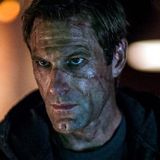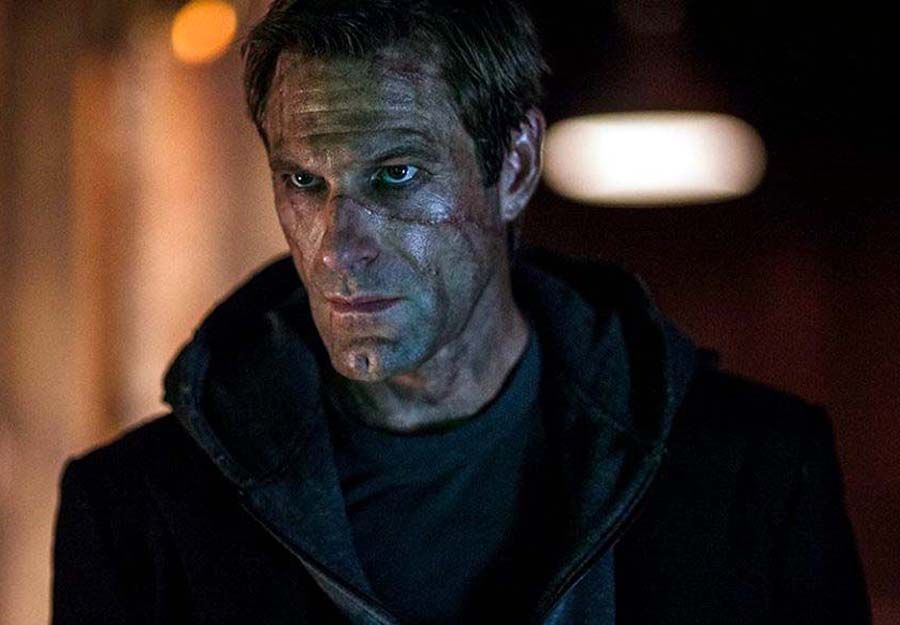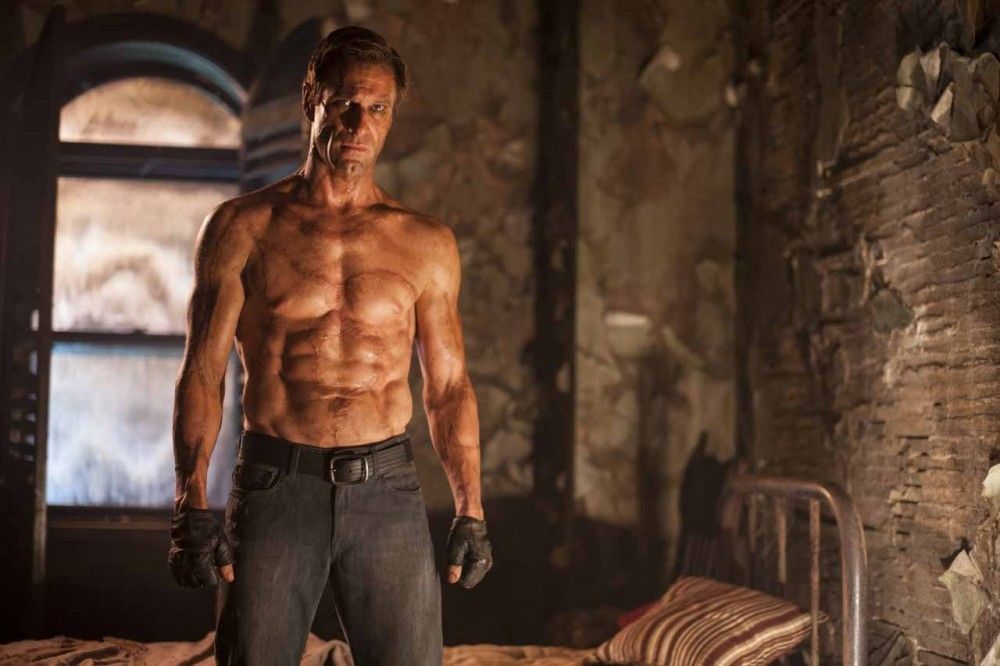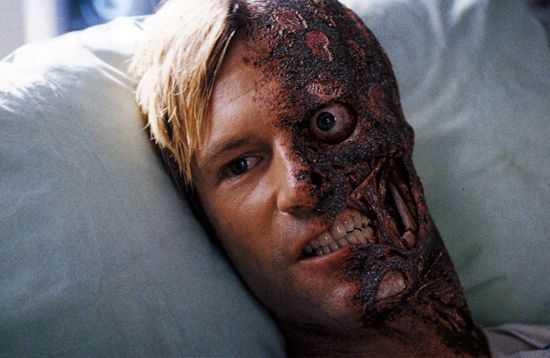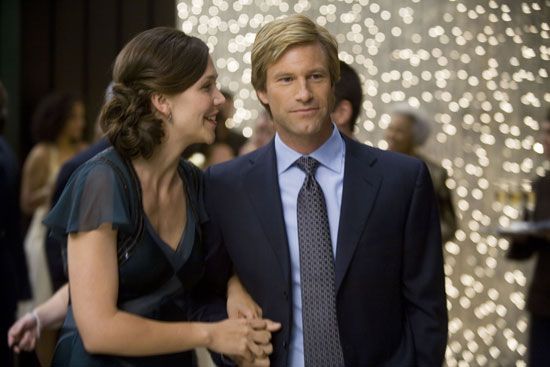There’s a proverb that goes, “You either die a hero, or live long enough to see yourself interview Aaron Eckhart.” Or something like that.
I recently found myself in the latter position, as I sat in a hotel room speaking with the Dark Knight actor about his new movie I, Frankenstein. Written and directed by Stuart Beattie, the 90-minute fantasy action film stars Eckhart as Frankenstein’s monster, loose in the modern day, at the center of an ancient conflict between gargoyles and hellish. Dubbed “Adam” by a gargoyle queen, the monster uses brute force and Kali sticks to unleash hell upon the equally hellish demons.
When we spoke, Eckhart was nearly indistinguishable from his I, Frankenstein character, and not just because of looks. The actor was recovering from a bout of the flu — not a desirable condition for anyone, but particularly difficult for an actor at the start of a press day filled with wall-to-wall interviews. Ailment aside, Eckhart was game for a quick chat about the movie; he was especially animated on the subject of Kali stick-fighting, and how that kind of training for movie roles has irreversibly changed his outlook on life.
Read on for all that and more, including a brief look back at Eckhart’s time filming The Dark Knight.
Spinoff Online: What was the appeal of this movie for you? What hooked you into I, Frankenstein?
Aaron Eckhart: I knew immediately that I wanted to do it, mostly because the script had elements in it that I liked. As an actor, you’re looking for the human struggle. I liked the action element of it. I liked this world that Stuart took us into. But it was mostly that here’s a guy, looking for his purpose in life. I thought that that was cool, and that anybody could relate to that. And the sticks — I thought the sticks were cool.
I met with Stuart and thought he was great. You meet some directors and you know right away that they can tell a story, which is the most important thing. Some are better at it than others. Stuart, he loves actors, he loves filmmaking, he’s a very nice guy, and he’s a hard worker. He put all of the elements together. This is his baby, 100 percent.
How were you able to connect with Adam as a character? Did you find yourself taking him home with you?
In a lot of ways, yeah. And just by walking around in the city. You go out of your hotel, you’re walking around crowded streets, nobody pays you any attention. You’re in a different town, far from people you love. People recognize you and you don’t want them to recognize you, so you mask yourself, you put on a hood, you go out in disguise — when you do get recognized, you hide yourself. There are a lot of similarities here, in terms of everyday life.
In the movie, there’s a 200-year gap from when we first see Adam to when we see him in the modern day. For all we know, Adam is doing nothing out there in the wilderness other than practicing with those Kali sticks twenty-four hours a day, seven days a week. Did training with Kali sticks help you connect with the character? Have you retained any of that training?
Yeah, you have to retain it, because it’s in your muscles now. Now, that being said, I’ve forgotten a lot of it — but not the core. I had never heard of Kali stick-fighting before the movie. Ron and Diana Balicki showed up at my door and they gave me an education. We worked three hours a day. It looks like you’re just swinging sticks around, but it’s a very precise, complicated discipline. It’s very dangerous. One wrong move and you’re done. But I feel like if somebody came in here …
If somebody swung in through that window …
Yeah, you’re always looking around for things. “What can be a weapon?” The great thing about this kind of training is you look at everything differently. “What am I going to use [if I have to fight]? How am I going to use it?” It’s second nature now. You have bottles over there. How are you going to do the most damage? And not only that, but after you do your first move — that’s important — but more important is …
“What’s the follow-up?”
What’s the follow-up, what are my next three moves? I can get off three moves before you know what to do. It’s like with boxers. I box; I like to train box. You get with a real boxer, and they’re just like, “I’m going to hit you here, here and here.” The strength and the precision and the quickness — you don’t stand a chance. It’s dangerous.
You were Two-Face in The Dark Knight. Heavy make-up isn’t something you’re new to. But what was the process like for this movie? At least in Dark Knight, you were full-on Harvey Dent for most of the movie. In I, Frankenstein, it’s scars right from the beginning.
I knew coming into the movie, every day would require make-up. That took that question away. “Are we in make-up today?” Yes, every day. That was it. So I made it work for me. I got that two or three hours every day to drop into my character. You’re in front of a mirror. I’d just go inside of myself. No one would bug me. And then, boom, I’d come out of that chair, ready to go. I had all of the necessary coal inside of me to burn a hot fire. And then at the end of the night, they would try to rip it off in ten minutes. [Laughs]
It’s good. I like that make-up. I don’t know if I could do … it’s not my “thing.” I wouldn’t want to do it for every single movie. But in a lot of ways, it does a lot of the work for you. You can’t help it. You pass yourself in a mirror, or you look at yourself in a window, you can’t help it. You’re looking at that.
I mean, look at Heath [Ledger] in The Dark Knight. You put a mask on yourself, and you give yourself license to be and to act as a totally different person. It’s good. I like it. Especially because we’re in a totally imaginary world from Stuart’s mind, with the gargoyles and everything. And there’s so much green screen. You have to find an anchor.
With Two-Face, because that’s all computer-generated, we had a little bit of make-up on. But had we known what he was going to look like in the final result, I think people would have reacted in a different way, because he was terrifying, and it looked so good. But because we couldn’t have that make-up present on the day, other actors weren’t able to experience Two-Face as Two-Face.
While we’re talking about it, I’d love to hear more about your experience with The Dark Knight. It holds a special place in a lot of people’s hearts. Does it stand out as a special project for you?
Oh, for sure. Mostly because of Heath, you know? Seeing an actor give everything to a role. Especially when you’re doing a comic book movie. It can get tongue-in-cheek, but this guy gave it his all. It was deadly serious to him. And that’s what it needed. That movie needed Heath. I enjoyed watching that. I enjoyed being a part of it, working with Gary Oldman and Chris Nolan, and seeing a big movie. It’ll be interesting to see where Batman goes now, without Chris directing.
Is Harvey a character you’ve held onto at all? Are there any characters that have been difficult for you to shake?
No. After every movie, as soon as the movie is done, I forget everything. [Laughs] I forget all my lines. As soon as I say a line, I forget it. Maybe it’s because I’m getting old. But I don’t have a problem with that. There are some characters I enjoyed playing, like my character in Battle: Los Angeles. But no, I’m not nostalgic about my movies in that way.
I would like to play Chad again, from In the Company of Men, or Nick Naylor [from Thank You For Smoking] again, things like that. But I’m not nostalgic. I look at what’s ahead of me. I don’t look at what’s behind me. I don’t have a relationship with it. After I’m done, I’m done. I move on. There’s too many exciting things in the future.
I, Frankenstein opens on Friday.

